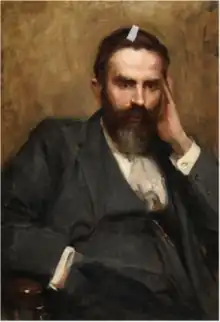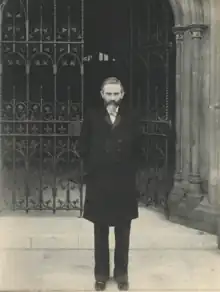Sir Thomas Russell, Bt | |
|---|---|
 | |
| Member of Parliament for Tyrone North | |
| In office 6 October 1911 – July 1918 | |
| Preceded by | Redmond John Barry |
| Succeeded by | Constituency abolished |
| Member of Parliament for Tyrone South | |
| In office July 1886 – January 1910 | |
| Preceded by | William O'Brien |
| Succeeded by | Andrew Horner |
| Personal details | |
| Born | 28 February 1841 Cupar, Fife, Scotland |
| Died | 2 May 1920 (aged 79) |
| Political party | Liberal (1910–1918) |
| Other political affiliations | Russellite Unionist (1904–1910) Liberal Unionist (1886–1904) Liberal (pre-1885) |
Sir Thomas Wallace Russell, 1st Baronet MP PC (Ire) (28 February 1841 – 2 May 1920), was an Irish politician and agrarian agitator. Born at Cupar, Fife, Scotland, he moved to County Tyrone at the age of eighteen. He was secretary and parliamentary agent of the Irish temperance movement and became well known as an anti-alcohol campaigner[1] and proprietor of a Temperance Hotel in Dublin.[2]
Career

He unsuccessfully contested Preston in 1885 as a Liberal. However, he opposed William Ewart Gladstone's Home Rule policy and was elected to the House of Commons of the United Kingdom of Great Britain and Ireland as a Liberal Unionist in 1886 for South Tyrone. He served between 1895 and 1900 as Parliamentary Secretary to the Local Government Board in the Unionist administration[1] of Lord Salisbury.

However, Russell's views on Home Rule underwent a change around the turn of the century and he gradually became a critic of Unionist policies in Ireland. From 1900 put himself at the head of the Farmers and Labourers Union, an Ulster tenant-farmer protest movement demanding compulsory land purchase,[2] similar to the land and labour movement in the south. His 1901 book Ireland and the Empire was an attack on the Irish agrarian system.[1] From 1902 to 1903 he was a key Ulster farmer representative[3] at the Dublin "Land Conference" which resulted in the passing of the Land Purchase (Ireland) Act 1903. This defused the Protestant tenant farmers' revolt.[4]
Russell continued to represent Tyrone South in Parliament. In 1906, supported by Lindsay Crawford and his Independent Orange Order while at the same acknowledging his debt to Catholic tenant farmers,[5] he was re-elected as an "Independent Unionist", one of several candidates referred to as "Russellite Unionist".
Russell was vice-president of the Irish Department of Agriculture and Technical Instruction[1] (DATI), in which capacity he displaced Horace Plunkett as head of the Department in 1907.[2] He disapproved of Plunkett's cooperative Irish Agricultural Organisation Society involving itself in the affairs of farmers, and ended DATI's help for the society.
He rejoined the Liberal Party and stood as a Liberal candidate at the general election in January 1910, when he lost his seat to the Unionist Andrew Horner.[6] Russell does not appear to have contested the December 1910 general election, but in 1911 he won a by-election in Tyrone North, a seat he held until the constituency was abolished in 1918.[6]
Russell was sworn of the Irish Privy Council in 1908 and created a Baronet, of Olney in the County of Dublin, in 1917.[7] He retired from politics in 1918 and died in Dublin on 2 May 1920, aged 79, when the baronetcy became extinct.
Arms
|
Notes
- 1 2 3 4 Chisholm, Hugh, ed. (1922). . Encyclopædia Britannica. Vol. 32 (12th ed.). London & New York: The Encyclopædia Britannica Company. pp. 308–309.
- 1 2 3 Maume, Patrick: The long Gestation, Irish Nationalist Life 1891-1918, "Who's Who" p.242, Gill & Macmillan (1999) ISBN 0-7171-2744-3
- ↑ Jackson, Alvin Home Rule: An Irish History 1800—2000 p.108, Phoenix Press (2003) ISBN 0-7538-1767-5
- ↑ Maume, Patrick: The long Gestation, Irish Nationalist Life 1891-1918, Ch.2 'Elites' pp.40-42, Gill & Macmillan (1999) ISBN 0-7171-2744-3
- ↑ Rees, Russell (2008). Ireland 1900-25. Newtownards: Colourpoint Educational. pp. 107–109. ISBN 9781906578008.
- 1 2 Parliamentary Election Results in Ireland, 1801-1922, edited by B.M. Walker (Royal Irish Academy 1978), pp. 376–378
- ↑ "No. 30224". The London Gazette. 10 August 1917. p. 8130.
- ↑ "Grants and Confirmations of Arms Vol. L". National Library of Ireland. p. 144. Retrieved 26 June 2022.
External links
- Leigh Rayment's baronetage page[usurped]